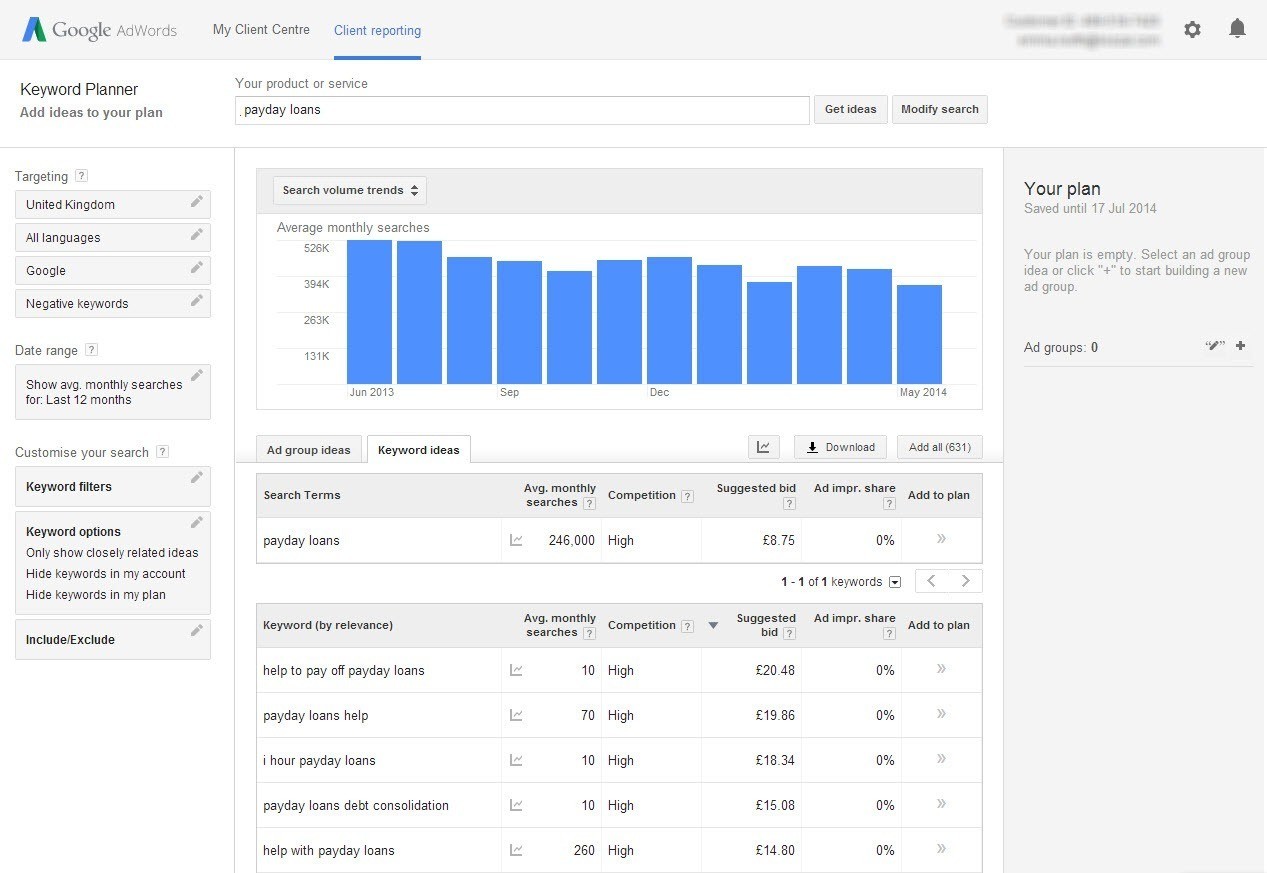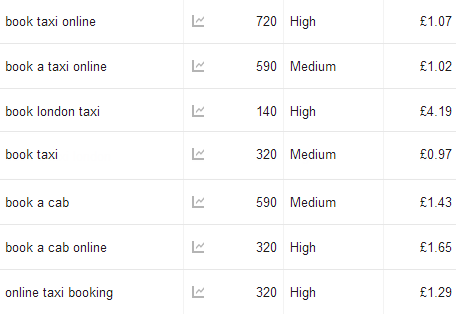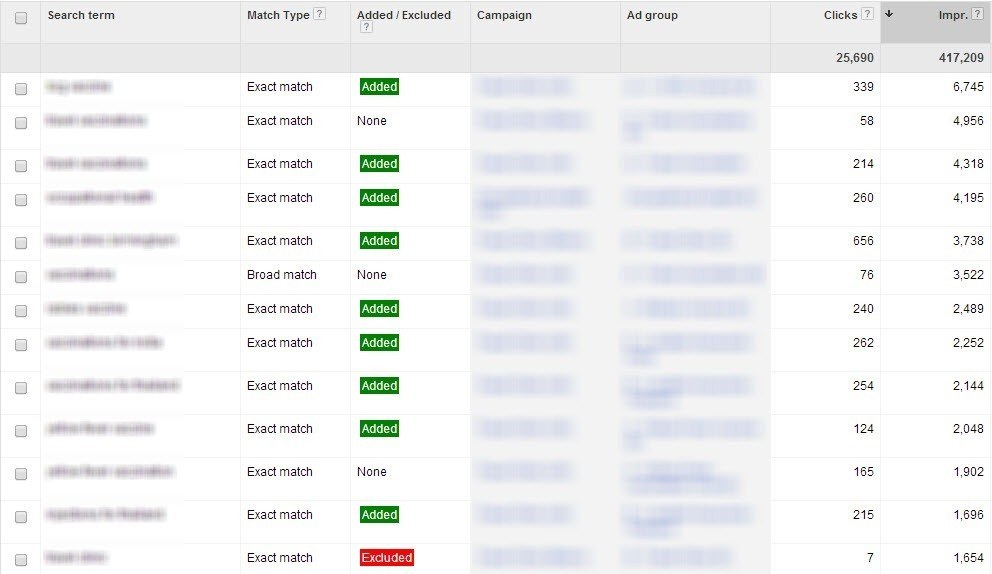 Setting up and maintaining strong, high performing AdWords campaigns takes time, budget and expertise. But without keyword research both at the beginning of the project and continually throughout, you will never get the best possible return on your investment.
Setting up and maintaining strong, high performing AdWords campaigns takes time, budget and expertise. But without keyword research both at the beginning of the project and continually throughout, you will never get the best possible return on your investment.
Here’s what you need to know about keyword research at the different stages in your AdWords project and why it’s so critical to success.
Budgeting and Forecasting Average Cost per Click
First and foremost, without keyword research you cannot know how many clicks you can expect to get for your budget. As the average cost per click in AdWords varies dramatically from keyword-to-keyword and industry-to-industry, keyword research is the only way to estimate what your clicks might cost.
For example, if you are looking to run a campaign for a payday loans company and assume that your average cost per click will be similar to a campaign you created in the past for an estate agent website, your budgeting will be grossly miscalculated from the beginning without first researching the costs you can expect to pay in your industry. You might have paid around £1-3 a click in the past, but keyword research will show you that clicks on payday loans-related keywords could set you back £10-20 a click or even more.

Keyword research is therefore essential even at this very early stage of a campaign. This will ensure that your expectations on cost are as reasonable as possible and give your campaigns the best chance to succeed.
Choose Keywords Designed To Achieve Campaign Goals
When you set up an AdWords search campaign, it’s important to think about what you want to achieve. When it comes to setting up ad groups and selecting keywords, you need to make sure they are relevant, specific and unambiguous.
Carrying out keyword research with your project goals in mind will allow you to select keywords that are more likely to deliver the results you’re looking for.
For example, if you are a tanning centre in London looking specifically to get online session bookings from your search campaign, you might initially think to target the keywords “spray tan” or “tanning booth”. With keyword research, you may find that there is a good amount of search volume for more qualified enquiries such as “book spray tan” or “spray tan in london”. If users search for these sorts of queries, they are more likely to be looking to make a booking and could be worth more per click to you than a user with a more ambiguous search such as “tanning booth”.
With comprehensive keyword research you can look to find relevant keywords that have a good amount of search volume, have a reasonable average cost per click, and are more likely to meet your campaign goals.
Find Keyword Varitaions That Could Increase ROI
If you do not carry out comprehensive keyword research before you launch an AdWords search campaign, the keywords you end up targeting are not likely to perform as well or deliver maximum ROI. This is because you do not know what keywords are being searched for or how much those keywords might cost per click.
For example, if you are a local taxi company setting up an AdWords search campaign, you might want to set up ad groups with keywords such as “book a taxi” and “taxi phone number”. But with proper keyword research, you might find that there are more search queries in your area for the search terms “taxi bookings” and “call a cab”, or that those keywords are much cheaper on average per click.

To get your campaign off to the best possible start, make sure you research the keywords you want to target and find as many potential alternatives that data suggests could provide positive ROI for your business.
Negative Keyword Research to Reduce Irrelevant Ad Exposure
The Search Query Report can be found in the Keywords tab of the AdWords interface and is one of the platform’s most useful reports. By using the Search Query Report you can see some of the search terms users have actually used to trigger your ad.
If your campaign only uses exact-match keywords and the setting to allow for misspellings and plurals is not ticked, you would only see your actual keywords in this report, shown as “Added”. However, as most campaigns will include phrase and/borad match keywords, as well as misspellings and plurals, this report can provide you with a wealth of information to help you refine your campaign further and conserve budget that might be being wasted on irrelevant search terms.

For example, if you are a fashion accessories retailer bidding on “leather wallets” on phrase match, you might expect to see terms like “leather wallets”, “luxury leather wallets” and “leather wallets for him” in your Search Query Report. However, what if you could also see that your ads were being triggered for “fake leather wallets” and “leather feed for leather wallets”, search queries not relevant to your ad or business?
Use the Search Query Report to find irrelevant queries to add to your campaign as negative keywords, stopping them from triggering ads in the future. In addition, look for relevant, high-performing search queries that are not currently set up as keywords. You can then add those in as positive keywords in their own ad groups with ads optimised specifically for them.
By using the Search Query Report regularly and reviewing the actual terms users search for that trigger your ads, you can help to ensure that budget is not wasted on irrelevant search queries that cost you when users click, but provide no value to your business.
Get Researching!
Hopefully that gives you enough reasons for you to ensure you carry out keyword research both before running and throughout an AdWords campaign.
Google’s Keyword Planner is one of the most useful tools for keyword research and will help you find out how many people are searching for your keywords and what you can expect to pay per click. The tool will even suggest more keywords that you might not have considered and help you build a strong, targeted campaign.
If you have any questions on keyword research or would like information on PPC management, please do not hesitate to get in touch.
Image Credits
Keywords Image via Bigstock

Leave a Reply